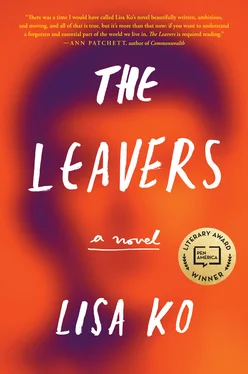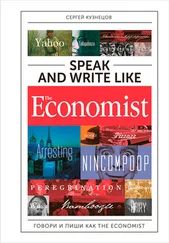Yong wrapped his arms and legs around mine. We lay there together, like we had every night for the past seven years. I put my head on his chest. You and Michael would be laughing, Vivian and I talking at the table.
“I know it’s a mess, but it’ll be done soon,” he said.
“What are you talking about?”
“The kitchen.” His eyes perked. “I spoke to the contractors about the cabinets. They’re going to special order them.”
“Okay. Wonderful. Thank you.”
He kissed me. “Good night.”
I tugged my sleep mask down. Yong could fall asleep in broad daylight, but I insisted on heavy curtains in the bedroom. Sometimes his ability to sleep soundly felt like a personal offense.
I listened to his breathing, deep and regular, as the pill began to take me under. I was too tired to talk now; I’d wait and call you another day. “Good night,” I said. But Yong didn’t say anything, he was already asleep, and it was only my own voice I heard, talking to myself in that dark, quiet room.
7
The house on 3 Alley had been as silent as our bedroom by West Lake. My father used to say women yapped too much, that some women would be better off not talking at all. So I’d grown up eating my words, and it wasn’t until later that I realized how many had gotten backed up inside me. In the factory dorm, sentences spilled out of me like a broken faucet, and when I moved even farther away and saw children splashing into rivers spurting from fire hydrants, water pouring into the streets like it was endless, I would see my younger self in that hydrant, but tugged open, a hungry stream.
If you knew more about me, Deming, maybe you wouldn’t blame me so much, maybe you would understand me more. I can only be as honest as I know how to be, even if it might not be what you want to hear.
My mother died when I was six months old. Cancer. I didn’t remember her, never had a picture of her, nothing. In the two-room house where I lived with your grandfather, there were only two things that had belonged to her: a blue jacket and a gray comb. When Yi Ba was out on the river I would run the comb through my hair and put on the jacket, a cloth coat that smelled weakly of leaves and scalp, the threads unraveling more each time I wore it, until one day the bottom button, dark blue, four tiny holes, tumbled right off. I found it trying to escape the room but clamped my fingers down and kept it safe inside the bag where I stored the comb.
“Was she smart?” I asked Yi Ba. “Was she pretty? What was her favorite fish?”
He’d go, “Sure, sure.”
I decided my mother had been a short woman with wavy hair, because I was short and my hair was a little wavy. There was this mother in the village who had a voice like a chiming bell—“Come here, Bao Bao,” she’d say at the produce market, “don’t play in the dirt”—and whenever I was sad about not having a mother, which wasn’t that often, I’d replay this chiming voice, pretend the woman was saying my name (Peilan, I was Peilan then) instead of Bao Bao’s.
My father liked to say things like this: “When I was a boy, my family was so poor, my brother and I shared a single grain of rice. People croaked all the time, but nowadays people are soft and spoiled. You don’t know what it’s like to suffer.”
Minjiang was a poor village in a poor province, but compared to some of my primary-school classmates, we ate pretty well. The fish Yi Ba caught supplemented the vegetables that our assigned plot grudgingly produced, and when there wasn’t enough food, he’d push his portions on me. “See what Yi Ba does for you?” he would say. I’d try to pass the food back to him, but he would say I had to eat every bite. You couldn’t waste food when there were people starving.
On good days, my father took me out on his fishing boat. We got up at sunrise, long before the heat set in, so early that swirls of fog blocked our path. Yi Ba carried a container of tea as I padded beside him with a handful of beef jerky, the ground spongy beneath my feet. “It’s a lucky day,” he would say. “See the way the clouds are like cobwebs? That means the water will be friendly.” On the western edge of the riverbank, the water was only visible between the clusters of long boats, and even the smallest waves would set off a series of wooden knocks, one boat bobbing against the side of the next boat bobbing against the side of the next, a string of hollow, mirrored noises. Yi Ba’s boat was dark green; brown stripes exposed where the paint had peeled, a patched-over, fist-shaped dent at the helm, a punch from a hidden rock. I’d help him untie it and we’d push out into the current. “Lucky, lucky, lucky,” I chanted, watching the waves lap at the wood like hundreds of tiny tongues. Then the shoreline would grow dimmer and the blue would shoot in all directions, filling the frame around me, the sky so big it could swallow me, and I cracked open with happiness.
On a less good day, the mountains would hem and corner me, everywhere another unscalable hill, the frowning clouds wagging their tongues: bad girl, bad girl.
Back then, leaving the village made you suspect. You might leave to marry a boy in another village and come home on holidays — look how fat and happy my kids are! — but otherwise, you stayed put. It wasn’t as if Yi Ba had wanted to be a fisherman and remain stuck in Minjiang, but there weren’t other choices for rural people, and he’d never gotten beyond grade four, though his younger brother had gone to grade seven and moved to a nearby town. So Yi Ba stayed in the same house where his parents had raised him. He told me about the paved streets of the town where his brother lived, the pictures of Shanghai he’d glimpsed in a magazine. I asked if we could go there, and he said no. Then who lives there? I asked. He said, “Rich, lazy people.”
We had a chicken. It was my job to collect the eggs, scatter feed. I’d strut around the grass with my pigtails forming stiff horns, poking my head in and out. The neighbors’ son, Haifeng, would abandon his own chores and run out to join me. “Let’s be like horses,” I would say, and we would gallop around, neighing.
I had two girl friends, Fang and Liling. We liked to play by the river after school and I would point at a speck and say, “That’s my father’s boat,” even if I didn’t know if it was his or someone else’s or a big rock. We held our arms up as we ran beneath the tree in the village square, letting the leaves kiss our fingertips.
I ALWAYS TOLD YOU not to be like me. I quit school in grade eight. Stupid. I’d asked a boy who was an even worse student than I was, but whose parents were cadre members, to give me a cigarette. (“Girls don’t smoke,” I heard him say, and that was a dare I couldn’t resist.) The inhale made my lungs burn, but I held it in and forced down the coughs and exhaled so smooth and neat, letting the smoke exit my lips in a perfect curl. Teacher Wu paddled me but not the boy. I leaned over his desk as he whacked my butt with his wooden board, and as I faced my classmates’ stunned faces, I laughed. I had seen boys cry when they got the paddle, but this smacking was no big deal.
I didn’t go back after that, and the summer passed in the slowest ooze. My hair grew longer, my face sharper, and I swept the rooms until the floors were clean enough to lick. The whole village was sleepy that summer, a still pond on a humid day. The striped plastic tarps strung across the alleyway were faded and torn, and the vendors with their flip-flops, batteries, and scratchy panties in individually sealed plastic bags looked resigned to never selling anything. Our chicken’s eggs were smaller, like she’d struggled to push them out.
For weeks it didn’t rain. The grass got patchy and brown, Yi Ba complaining about the commercial fishing boats coming down the river from Fuzhou, with industrial-sized nets that could snatch up all the fish. He’d leased his boat to a younger fisherman and had gotten a job canning fish at a new factory, but the factory shut down and moved to the city and he had to refund the rest of the fisherman’s lease to get his boat again. During the three months he’d worked at the factory there had been beef for dinner twice a week and even dried tofu to snack on and a new orange shirt for me, though I was clumsy and ripped the sleeve while climbing a tree with Liling and Fang. I missed the chewiness of the tofu — I’d marinate the chunks against the side of my mouth and be rewarded with a stream of salt.
Читать дальше











